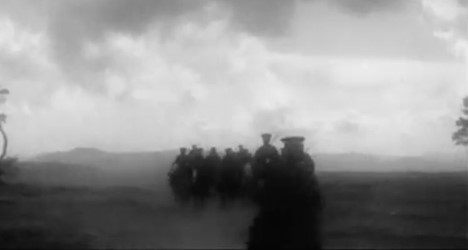Storm Over Asia (1928)
Vsevolod Pudovkin's "Storm Over Asia"
In the final film of Vsevolod Pudovkin's "revolutionary trilogy," after "Mother" and "The End of St. Petersberg," "Storm Over Asia" deals with a different aspect of the Russian Revolution. Where the prior two films focused more on the European side of Russia, "Storm Over Asia" deals with Asian relations.
In the film, a Mongolian joins in the Soviet's fight for independence. However, after British forces capture the Mongolian, they sentence him to death. They then learn that this Mongolian is a direct descendant of Genghis Khan. After learning this information, they revive the Mongolian and put him in charge of a puppet government. The Mongolian then turns against his British oppressors in a fiery rage.
This Soviet propaganda film deals with British interference in the Mongolian government. It criticized the Western capitalists and their negative influence on the East. It also implores its Russian government and citizens to utilize the beneficial relationship of their southern neighbors.
Pudovkin uses Soviet montage in some brilliant moments in this film. One such moment is when both the British and Mongolians are preparing to meet each other. He shows images of the British pampering themselves and adorning their attire, such as uniforms, corsets, and bedazzled jewelry. He contrasts these images with the Mongolians adorning their cultural attire. Pudovkin uses contrasting images to suggest that there is no difference between cultures, as both have their own unique dress and ceremony. Another example is at the end of the film when the Mongolian erupts in anger against his British oppressors. Pudovkin splices images up so quickly that the viewer feels a sense of chaos.
The film has been noted by film critics to not be entirely historically accurate. The British government was not as involved in Mongolian relations as the Soviets were. Despite this, the film was able to suggest skewed political perspectives that had a great influence on its people




Comments
Post a Comment